Beth Tabler's Blog, page 217
September 10, 2021
Review – Behind Blue Eyes Fallen Angels by Anna Mocikat
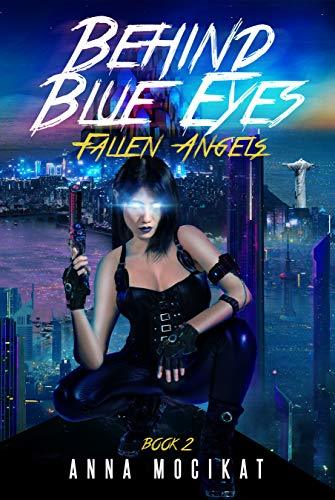 check it out here
check it out here BOOK REVIEW
behind blue eyes - Fallen Angels by anna mocikatREVIEW BY C.T. PHIPPS
September 10, 2021 10:00 am No Comments Facebook Twitter WordPressI was a huge fan of BEHIND BLUE EYES by Anna Mocikat, which was a breath of fresh air in the cyberpunk genre. The cyberpunk genre has had a recent revival with the successful Netflix adaptation of the Altered Carbon books by Richard K. Morgan as well as the semi-successful release of Cyberpunk 2077 by CD Projekt Red.
So I was in the mood for something full of action, twists, turns, and world-building that Behind Blue Eyes provided in spades. A warning before I proceed that this review will contain spoilers for the ending of the book as its otherwise hard to talk about the sequel. Right? You have been warned.
FALLEN ANGELS picks up after the events of the first book with Nephilim having been captured, brainwashed, and restored to “factory default.” Metatron, her master, has also promoted her as well as made her his lover as a way of displaying the full length of his control over her. As an Archangel, leader of the cyborg Guardian Angel death squad, Nephilim is seemingly content with the very life that repelled her in the previous book. Indeed, she’s actually helping Metatron plot against the corrupt Olympias board of directors that rules rules all of the Western Hemisphere.
These plans hit a snag, though, when someone starts murdering Guardian Angels. They are found spread throughout the city, gutted like fish, and it becomes an equivalent of Seven. The actual lives lost are immaterial to Metatron, though, because he’s not concerned about his brainwashed slaves. No, it’s the fact that it is exposing the Guardian Angels as vulnerable to being killed. Without the illusion of invulnerability, the Guardian Angels do not have nearly the power they need to mount his coup that Metatron is planning.
This book does a great job of fleshing out the world that was previously mostly seen through Nephilim’s propgaanda-influenced eyes. We get to see Eastern Europe under the control of the Robsum Corporation where romantic interest Jake has been forced to retreat despite his love of Nephilim. We also get a sense of how Brazil has been changed under megacorporation control. I always like these kind of details and the discussion of the various methods that the populace is being kept in line.
The best part of this book is definitely the introduction of police officers, Shiro and Spider. These two are “ordinary” citizens of Olympias City and provide another perspective on the Guardian Angels as well as Olympias Corporation. I really enjoyed watching them play off one another and think they would make a pretty good pair of protagonists for a cyberpunk police procedural series. Too bad they’re in a series where a bunch of Weapon X supersoldiers are capable of slashing through small armies.
In conclusion, I really enjoyed this book. It is full of action, twists, turns, and psychological examinations of the main character. I feel bad that Nephilim remains brainwashed for much of the book, especially since Metatron pretends he’s in love with her. However, I think that is part of the story to Nephilim finally turning on and getting her revenge on him. This is a great book and available to all Kindle Unlimited users for free.
Check Out some of our other reviewsReview – Psycho Killers In Love by C.T. Phipps
C.T. Phipps
C.T Phipps is a lifelong student of horror, science fiction, and fantasy. An avid tabletop gamer, he discovered this passion led him to write and turned him into a lifelong geek. He is a regular reviewer on Booknest.EU and for Grimdark Magazine.
He’s written the Agent G series, Cthulhu Armageddon, the Red Room Trilogy, I Was A Teenaged Weredeer, Lucifer’s Star, Psycho Killers in Love, Straight Outta Fangton, The Supervillainy Saga, and Wraith Knight.
September 9, 2021
Review – The City of Brass (The Daevabad Trilogy #1) by S.A. Chakraborty
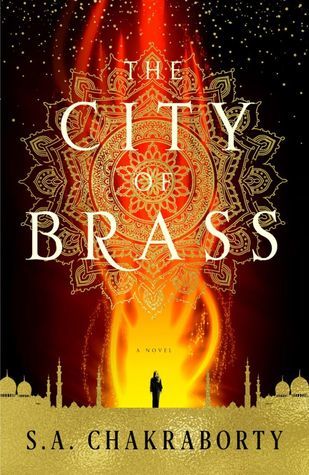 check it out here
check it out here BOOK REVIEW
THE City of brass by s.a. chakraborty 8/10
September 9, 2021 10:00 am No Comments Facebook Twitter WordPress “Greatness takes time, Banu Nahida. Often the mightiest things have the humblest beginnings.”
Hello dear reader !!
Today I come to you with a review for a book filled with djinn, a mesmerizing setting, and court/societal intrigue !!
For truly just like the protagonist Nahri is whisked away into a world full of magic she never believed possible, by a mysterious djinn warrior of old, so is the reader drawn into this new setting steeped in Arabic and other eastern traditions and mythologies.
I had been looking for another djinn themed series for ages because I always enjoy that mythology and it had been some time since I last had the pleasure of reading one! I was not disappointed, and in fact, I thoroughly enjoyed reading about the world that Chakraborty created, and her prose is evocative as it is flowing.
You could say I fell in love with Daevabad as a place. As a society maybe not so much, with its prejudices and conflicts but details ahaha.
Plus I have a soft spot for immortals or even supernatural longevity in general, and the way that the author tackled how that impacted the djinn society was really interesting and fascinating. I also especially enjoyed the stark differences between characters that, like Dara, come from waaaay before the events of the main story, and how that impacted his attitudes and beliefs in contrast to the younger characters.
Chakraborty also masterfully navigates a world were you can never tell whose narrative is the truthful one (history is written by the victors after all) and there’s a constant air of mistrust and doubt that permeates any fact spreading or story sharing, that I found fit oh so well into the overall plot, and made me speed through reading this first installment in search of more clarity and answers !
Granted I had some grievances but those mostly fall to personal tastes and my seeing some of the narrative devices for what they where rather than feel them as an organic part of the story. To clarify in the least spoilery way possible, there were several instances of tensions and arguments that occurred purely for the purpose of propelling the heroine towards one outcome rather than the other, when up to that choice plot twist, things were clearly headed into a previous direction. With more than one instance of things happening purely because characters didn’t take a second to talk. It irked me, not gonna to lie, mainly because it was out of character for them occasionally, but I understand why it all had to happen so that’s something I suppose.
This is mainly the reason why I won’t be jumping into the sequel right away but I do however look forward to continuing the series because I need to make sure my favorite character makes it out in one piece by the end ! I’ve grown very attached to them and all the magic after all!
So then dear reader, if you like a gutsy and wicked smart female protagonist, badass action, a who is telling the truth and how many people are actually lying kind of narrative, sprinkled with lots of showing not telling, occasional snark, and beautiful magic, this is the book for you!!
Until next time,
Eleni A.E.
Check Out some of our other reviewsReview – The Final Girl Support Group by Grady Hendrix
Eleni A.E.
Eleni is a Greek student who grew up in Italy, and is currently working on getting her BA Honours degree in Literature from a Scottish university! When not typing away for her disseration, she can be found reading all the SFF she can get her hands on, and reviewing it for fun when inspiration strikes and she just needs to share her passion for reading. Alternatively, she will definitely be with a needy Westie in her arms watching series or movies. You can find her writing on her shared blog with her course mate at https://latenightbookscom.wordpress.com/ where there are also posts about other literary genres, or follow her day to day ramblings on Twitter @eleni_argyro or Instagram @the_words_we_read .
September 8, 2021
Review – Survivor Song by Paul Tremblay
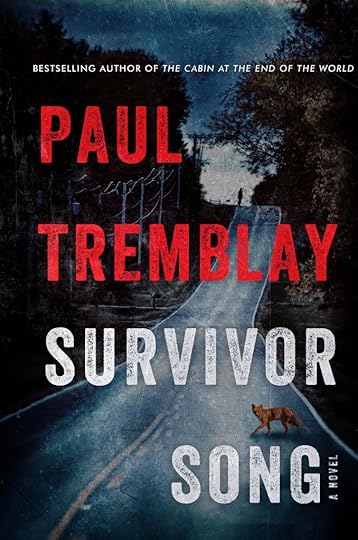 check it out here
check it out here BOOK REVIEW
survivor song by paul tremblay September 8, 2021 10:00 am No Comments Facebook Twitter WordPress “He jokes about this being a different and ridiculous timeline. Because why? Crazy awful stuff happening. Horrific shit has always happened, is always happening, and everywhere. And will happen, it won't stop. There aren't any other timelines and this one has always been a horror.”― Paul Tremblay, Survivor SongSurvivor Song by Paul Tremblay is a whip-cracklingly quick story that immediately pulls you into the nightmare and drowns you in emotions of fear, despair, and a little bit of hope.
Tremblay drops us into Massachusetts amidst an area slowly boiling over with a pandemic-like virus akin to Rabies. The pandemic spreads by saliva, and the inhabitants of that area are getting quite bitey. Paul, the hapless husband, runs out to the grocery store to help his very pregnant wife. This errand would be an everyday type of thing. Not noteworthy in the slightest. Paul, our loving husband, almost makes it but gets taken out brutally. His straightforward errand ended his life.
There is no build-up to brutal moments. They can come from anything. Which I think is one of Tremblay’s talents as a writer. His books tend to be small snippets of moments expanded into stories—a whole book in an hour or an afternoon. Books don’t always have to be giant lengthy tomes to be scary; they can be a small slice of the terrifying moments of someone’s life.
“the final tally of what will be considered the end of the epidemic [but not, to be clear, the end of the virus; it will burrow, digging in like a nasty tick; it will migrate; and it will return all but encouraged and welcomed in a country where science and forethought are allowed to be dirty words, where humanity’s greatest invention—the vaccine—is smeared and vilified by narcissistic, purposeful fools [the most dangerous kind, where fear is harvested for fame, profit, and self-esteem], almost ten thousand people will have died. *”
And while we feel pretty bad for Paul, this story isn’t about him. It is about the other protagonist we meet in the second chapter. Dr. Ramola Sharma. She is a pediatrician who is helping keep her patients calm during all this turmoil. She gets a call from her very pregnant friend Natalie begging for help. Natalie needs to get to the hospital asap so that she can deliver her baby safely. This idea of delivery in the center of an epidemic where everyone is trying to destroy each other is a scary juxtaposition in itself.
This is where the real meat of the Survivor Song happens: the struggle of these two women battling and struggling to get to the hospital to help Natalie. It is a fascinating story that leaves you breathless because it is not more profound than that. You root for these two women because they are trying so hard to survive, and we, as the readers, have connected with them a bit. Even if it is just superficially, you want these two ladies to live.
“Humanity’s greatest invention—the vaccine—is smeared and vilified by narcissistic, purposeful fools [the most dangerous kind, where fear is harvested for fame, profit, and self-esteem],”
Survivor Song is a well-done story by a master horror writer. There is some character development, but honestly, the speed at which events take place does not lend characters time to eternalize events that are happening to them. And grow from them as characters. It is kill or run. Do not get bit. Breathe. Do it again. The pacing is frenetic; the words practically vibrate off of the page.
If you are a fan of Tremblay, you will enjoy this book. I’d read this story for the pacing alone. Tremblay made me feel like I was running through the woods with branches whipping me in the face. Also, not surprising that it is a quick read as well. Even at 320 pages, it goes by fast. So come check out the struggle of these two ladies as they try to outrun a pandemic and try to save the life of an unborn child. You won’t be let down by it.
Check Out some of our other reviewsReview – The Final Girl Support Group by Grady Hendrix
Review A Head Full Of Ghosts by Paul Tremblay
Interview With Author Paul Tremblay
Beth Tabler
Elizabeth Tabler runs Beforewegoblog and is constantly immersed in fantasy stories. She was at one time an architect but divides her time now between her family in Portland, Oregon, and as many book worlds as she can get her hands on. She is also a huge fan of Self Published fantasy and is on Team Qwillery as a judge for SPFBO5. You will find her with a coffee in one hand and her iPad in the other. Find her on: Goodreads / Instagram / Pinterest / Twitter
September 7, 2021
Review – Gild by Raven Kennedy
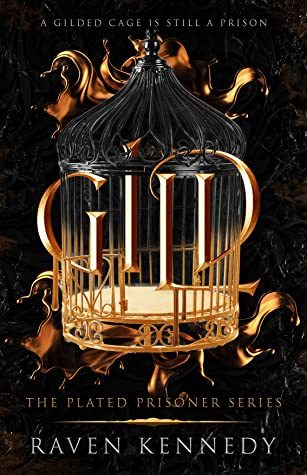 check it out here
check it out here BOOK REVIEW
GILD by RAVEN KENNEDY 3/5 September 7, 2021 10:00 am One Comment Facebook Twitter WordPress “A cage is a cage, no matter how gilded.”I can’t say I loved this book, but, neither can I say I hated it. If I were asked to describe Gild by Raven Kennedy in ten words or less, I would say “BDSM Billionaire Romance wrapped loosely in fantasy.” Let me start by focusing on what I thoroughly enjoyed about this book.
Kennedy does an excellent job building the world of Orea and introducing readers to the power structures within. She delivers magic abilities, fantastic beasts, snow pirates, pulse-racing plot twists, taut tensions, heart-breaking humanity, and wretched villains. Her prose is often breathtakingly beautiful.
Auren is the favored “saddle,” (concubine for those with gentler constitutions) of King Midas, the ruler of Sixth Kingdom. He rescued her from poverty, and she became his lover before he married Sixth Kingdom’s magic-less princess and ascended to the throne by dint of his magical golden touch. Only those with power can rule. She is the only person he has ever “gold-touched,” and he keeps her locked away in a gilded cage. She is precious and safe and bored out of her mind. Midas may have loved her once, but his love has twisted into a love of novelty.
King Midas is as duplicitous as the Greek mythologies suggest. King Fulke of Fifth Kingdom is his gullible ally in a plot to attack Fourth Kingdom, the domain of King Rot. Midas sends orders for his harem of “saddles”, including Auren, to join him in Fifth Kingdom. Their journey is the first time Auren has been outside in more than ten years. She takes every opportunity to escape the confines of her gilded carriage and breathe freely, befriending one of her guards along the way. When the party is hijacked by the Red Raids, Auren realizes and regrets the danger her status as “Midas’ Favored” has placed upon the others in the caravan. Her despair deepens as she discovers there may have been a spy in the entourage; a spy willing to sell the lot of them to King Rot’s fae warrior, Commander Rip. So far, so good!
Now, for what surprised me most about this book. Perhaps I should have read the synopsis more closely, taken it more seriously, something. I love a good sex scene. While there is a lot of sex in Gild, not much of it is very good. I did not anticipate a full-on, graphically described orgy within the first ten pages. I still wonder why this was entirely necessary. I don’t mind coarse language (full disclosure: my own language is often very coarse). However, in a work of fantasy, I was unprepared for modern speech patterns and shock-factor slurs. They almost seem gratuitous and unnecessary.
I kept waiting for Auren to NOT be the damsel-in-distress. I kept wanting her to claim her own agency. I kept wanting her to be more than the plaything of a childish king. I wanted her to recognize her own value. I needed her to not acquiesce so readily. I kept waiting for Midas to redeem himself. I needed him to not be an ass. I don’t regret reading Gild, but I probably won’t be reading further into this series. I didn’t care about the characters enough.
Check Out some of our other reviewsReview – The Final Girl Support Group by Grady Hendrix
Review The Lost Queen by Signe Pike
Whitney Reinhart
Whitney Reinhart is a reader, writer, sometimes editor/coach currently pursuing an MFA in Creative Writing because she believes every one has at least one story to tell. She lives (for now) in eastern Arkansas with the world’s smartest man and two Siberian Huskies posing as study buddies. Her work can be found on PocketFiction.co.uk and Fleas on the Dog. .
WHERE TO FIND HERVisit her website, meanderyme.com, for links, book reviews, writing tips, and sign up for her monthly newsletter, Wanderings
If You Liked This - Please Share the LoveFirst Chapter, First Paragraph – Cryptonomicon by Neil Stephenson
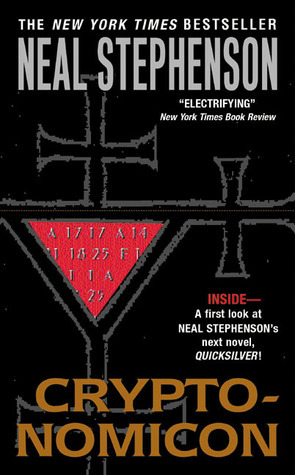
Cryptonomicon zooms all over the world, careening conspiratorially back and forth between two time periods—World War II and the present. Our 1940s heroes are the brilliant mathematician Lawrence Waterhouse, crypt analyst extraordinaire, and gung-ho, morphine-addicted marine Bobby Shaftoe. They’re part of Detachment 2702, an Allied group trying to break Axis communication codes while simultaneously preventing the enemy from figuring out that their codes have been broken.
Their job boils down to layer upon layer of deception. Dr. Alan Turing is also a member of 2702, and he explains the unit’s strange workings to Waterhouse. “When we want to sink a convoy, we send out an observation plane first… Of course, to observe is not its real duty—we already know exactly where the convoy is. Its real duty is to be observed… Then, when we come round and sink them, the Germans will not find it suspicious.”
All of this secrecy resonates in the present-day story line, in which the grandchildren of the WWII heroes—inimitable programming geek Randy Waterhouse and the lovely and powerful Amy Shaftoe—team up to help create an offshore data haven in Southeast Asia and maybe uncover some gold once destined for Nazi coffers.
To top off the paranoiac tone of the book, the mysterious Enoch Root, key member of Detachment 2702 and the Societas Eruditorum, pops up with an unbreakable encryption scheme left over from WWII to befuddle the 1990s protagonists with conspiratorial ties.
Why it is important?If you are looking for deep philosophical science fiction that taps into crypto, patterns, history and so much more. You should read Neil Stephenson.
First Chapter, First Paragraph of CryptonomiconCheck Out Our Other First Chapter, First Paragraph
Two tires fly.
Two wail.
A bamboo grove, all chopped down From it, warring songs. . . .
IS THE BEST THAT CORPORAL BOBBY SHAFTOE CAN do on short notice—he’s standing on the running board, gripping his Springfield with one hand and the rearview mirror with the other, so counting the syllables on his fingers is out of the question. Is “tires” one syllable or two? How about “wail?” The truck finally makes up its mind not to tip over, and thuds back onto four wheels.
The wail—and the moment—are lost. Bobby can still hear the coolies singing, though, and now too there’s the gunlike snicking of the truck’s clutch linkage as Private Wiley down- shifts. Could Wiley be losing his nerve? And, in the back, under the tarps, a ton and a half of file cabinets clanking, code books slaloming, fuel spanking the tanks of Station Alpha’s electrical generator. The modern world’s hell on haiku writers: “Electrical generator” is, what, eight syllables? You couldn’t even fit that onto the second line!
First Chapter, First Paragraph – The White-Throated Transmigrant by E. Lily Yu
First Chapter, First Paragraph – Three Parts Dead by Max Gladstone
September 6, 2021
Review – We Men of Ash and Shadow by H.L.Tinsley
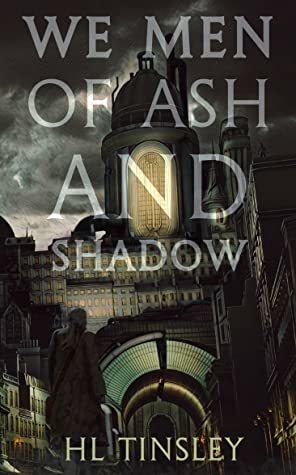 check it out here
check it out here BOOK REVIEW
we Men of Ash and Shadow by HL Tinsley September 6, 2021 10:00 am No Comments Facebook Twitter WordPressThe opening sentence of a story is important, we all know that. Coming up with a really good one is the test. Holly Tinsley manages it with the skill and originality that pervades the entire novel.
‘It was the most highly recommended venue the city had to offer. It was called The Ring O’ Bastards and it had the lowest patron-to-murder-victim rate in a five mile radius.’
It smacks you around the face as a declaration of its grimdark nature. And oh boy, is it grim and dark! The promise of sunshine is actually a motivating factor for one character, it is that rare! The city of D’Orsee is a status-controlling social construct where people are kept in their places by ruthless authorities and the licensing of criminals to maintain the status quo.
For me, the best elements of grimdark centres around its characters. That is true here. John Vanguard, our anti-hero, is a soldier-turned-mercenary-turned-assassin. He carries with him a heavy burden of grief which defines everything he does. He murders people, with skill and efficiency, never worrying about the ethics. They are people who deserve it.
Qualifying his character and motives as grimdark certainly. Set against him is one of two antagonists, Tarryn Leersac. He is a wonderful invention of pure villainy. He has no redeeming features, he is pure evil. Easy to define and bloody difficult to turn into a realistic character. The fact that Tinsley does this so successfully is an indication of the talent she possesses. Captain Sanquain, the vicious and ruthless controller of the city, is our other baddie. His heartlessness, his single-mindedness and readiness to kill anyone who gets in his way is usually enough to sustain the bad guy role but Tarryn upstages him.
The ability for Vanguard and Tarryn to appear almost invisible to other people, so they are rarely noticed, is a wonderful plot device. I liked how there is little referencing of this ability, at one point Vanguard questions whether it is magic or supernatural in nature but that’s it. It’s not important. It’s this mutual ability which will bring their rivalry to a head at the end.
Secondary roles are equally as vivid and crucial to the plot as well as defining the main characters. Carmen is my favourite, the tiny girl who grows in personality and determination as the story evolves. “I’m not a whore… I haven’t decided what I am yet.”
My only grouch is the constant shifting of POV. It threw me out of the narrative at times in its sudden shifts. But that is it. This is a truly awesome debut novel. I can’t wait to see what happens next in this series.
Check Out some of our other reviewsReview – The Final Girl Support Group by Grady Hendrix
Review Comfort me With Apples by Catherynne Valente
phil parker
It all started when his parents bought him a typewriter as a teenager, Phil hasn’t stopped writing since. That is a long time ago. (Think fossils). It’s led to the publishing of books for Drama teachers (he used to be one) and journalistic articles on education. Now Phil writes fantasy stories along with a recent adventure into contemporary fiction, a challenge from his wife. She’s read it twice!
Phil is an avid reader of speculative fiction. (Is there anything else?) He reviews for his blog at the Speculative Faction and for Before We Go. He’s been a judge for SPFBO.
Phil consumes pizza in vast quantities and plans on being reborn as an Italian in the next life.
WHERE TO FIND HIMTwitter: https://twitter.com/PhilSpeculates
Facebook: https://www.facebook.com/philparkerfantasywriter
Blog: https://www.philparker-fantasywriter.com/
Goodreads: https://www.goodreads.com/philparker-fantasywriter If You Liked This - Please Share the Love#MusicMonday: Jetta – I’d Love To Change The World (Matstubs Remix)

If you have never watched Sense8 on Netflix it is a worthy watch and this is one of the songs from the soundtrack. Fabulous, powerful imagery.
Check Out Some of Our Other #MusicMondays#musicmonday Earned it by The Weeknd from Fifty Shades of Gray
Lyrics - I'd Love To Change The World Everywhere is freaks and hairiesDykes and fairies, tell me where is sanity
Tax the rich, feed the poor
‘Till there are no rich no more I’d love to change the world
But I don’t know what to do
So I’ll leave it up to you Population keeps on breeding
Nation bleeding, still more feeding economy
Life is funny, skies are sunny
Bees make honey, who needs money, Monopoly I’d love to change the world
But I don’t know what to do
So I’ll leave it up to you But I don’t know what to do
But I don’t know what to do
But I don’t know what to do
But I don’t know what to do
So I’ll leave it up to you
And I don’t know what to do
September 5, 2021
Novel – Ink & Sigil by Kevin Hearne
 Beth Tabler 4/5
Beth Tabler 4/5  Ink & Sigil by Kevin Hearne Purchase Here
Ink & Sigil by Kevin Hearne Purchase Here Kevin Hearne, Ink & Sigil About Ink & Sigil“Nigel went to Toronto on holiday and got his skull cracked by a hockey puck.”―
Al MacBharrais is both blessed and cursed. He is blessed with an extraordinary white moustache, an appreciation for craft cocktails – and a most unique magical talent. He can cast spells with magically enchanted ink and he uses his gifts to protect our world from rogue minions of various pantheons, especially the Fae.
But he is also cursed. Anyone who hears his voice will begin to feel an inexplicable hatred for Al, so he can only communicate through the written word or speech apps. And his apprentices keep dying in peculiar freak accidents. As his personal life crumbles around him, he devotes his life to his work, all the while trying to crack the secret of his curse.
But when his latest apprentice, Gordie, turns up dead in his Glasgow flat, Al discovers evidence that Gordie was living a secret life of crime. Now Al is forced to play detective – while avoiding actual detectives who are wondering why death seems to always follow Al. Investigating his apprentice’s death will take him through Scotland’s magical underworld, and he’ll need the help of a mischievous hobgoblin if he’s to survive.
Ink & Sigil is Kevin Hearne’s first book in an exciting new series called aptly Ink & Sigil. if you aren’t familiar with Hearne’s novels, he has a couple of interesting series, the most famous being the Iron Druid Chronicles. “Atticus O’Sullivan, last of the Druids, lives peacefully in Arizona, running an occult bookshop and shape-shifting in his spare time to hunt with his Irish wolfhound.”
“A toast! Tae inks and sigils and straight razors, tae good bosses and wizards on lizards, tae outsmarting evil when ye can and kicking its arse when ye cannae do that, and tae distillers of fine spirits everywhere. Sláinte!”
In my opinion, the Iron Druid Chronicles is some of the best urban fantasy out there and has the most loyal companion dog in all of fantasy. Although, Mouse from Dresden Files is a very close second. The banter and characterization of Atticus’s Wolfhound make many of his books both movers and funny. The Iron Druid series set me on a quest to find an Irish Wolfhound for myself.
That is, until I found out the actual size of a said wolfhound—basically, the size of a VW Bug. And much like Mouse from the Dresden Files, a Fu dog and also the size of a VW Bug, he will have to be a dream for someday.
With all that being said, this new series has a lot of the flavor of the Iron Druid series, a wicked sense of humor, banter, and action. But, we have an entirely new type of magic to learn about and a new champion protagonist to cheer for in Al MacBharrais. Al, aside from being a slightly cantankerous sigil agent, has also been cursed. As soon as he speaks, his once melodious voice now causes the hearer to hate his guts.
Instead, he is forced to talk to folks using a text-to-speech program on his phone. Problems with his various text-to-speech devices do provide a bit of comedic fun. I believe that who cursed him will be the overarching mystery of the series.
Specifically, the great mystery to this book is what is happening to his apprentices. They keep up and dying on him. Geordie, his newest apprentice, although not a nice guy in any way, did not deserve to die the way he did. Much to Al’s dismay, Geordie had been living a double life and dabbling in an underground trafficking ring. Fae had been captured and sold to the highest bidder for often nefarious purposes.
This ring is where we meet our sidekick of a sort in Buck Foi, a rogue and mischievous hobgoblin set to steal all he can and drink all of the whiskey. Geordie had him trapped.
This underground trafficking ring and the untimely deaths of his apprentices set Al on a quest to find out who is doing the stealing and killing.
Ink & Sigil is such a fun book. Generally, all of Hearne’s books are irreverent and do not take themselves too seriously. His books have a light-heartedness peppered with action that keeps the pace rolling along but still makes you laugh out loud as a reader. However, I think that Ink & Sigil steps up the quality and intelligence of the comedy. It is a smarter comedy, although Buck Foi does throw in plenty of dick and fart level jokes to spice things up.
Also, technically Al is much, much younger than Atticus. However, Al has wisdom that Atticus does not. Maybe it is because of Al’s profession; Al is a sigil master. He crafts words and symbols with special inks and seals them for different effects. Al, himself, is not magical. But he has the intelligence to do great magic.
Conversely, Atticus does Earth magic and communes with Gaia. His magic is more inward, and dealing with the spirit requires less mind and more soul.
Maybe it is the type of magic he practices or because Al looks the part of a cantankerous older man. Unlike Atticus, who looks 22 but is over 2000 years old. But Al feels like he is one inch from yelling at you to get off his lawn.
These beautiful characters come together to make a fun story that is relatable and with a moving plot. Al is full of all sorts of surprises as well as his staff. Nothing is really as it seems. And like The Iron Druid, it is undoubtedly going to be a bit of a keeper. I can’t wait to read more.
Check Out Some of Our Other interview and reviewsInterview with Author Kevin Hearne
Hanging With My Gnomies in – No Country for Old Gnomes-; by Delilah S. Dawson, Kevin Hearne
If You Liked This - Please Share the Love Beth Tabler
Elizabeth Tabler runs Beforewegoblog and is constantly immersed in fantasy stories. She was at one time an architect but divides her time now between her family in Portland, Oregon, and as many book worlds as she can get her hands on. She is also a huge fan of Self Published fantasy and is on Team Qwillery as a judge for SPFBO5. You will find her with a coffee in one hand and her iPad in the other. Find her on: Goodreads / Instagram / Pinterest / Twitter
September 4, 2021
#SPFBO Review and Cut – Skyview: Lord of the Wills by M. Sheehan
 skyview lord of the wills by m. sheehan
skyview lord of the wills by m. sheehan 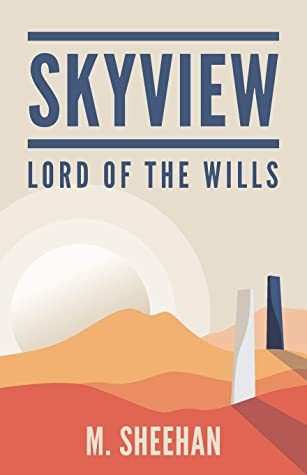 skyview lord of the wills by m. sheehan Buy A Copy Here What is it about?
skyview lord of the wills by m. sheehan Buy A Copy Here What is it about? A unique perspective on history and time, SkyView draws readers into a seven-hundred-year struggle between good and evil. Eight family lines are on a quest to discover and control the family’s centuries-old accumulation of wealth. William Ward, the twenty-first-century heir to this wealth, is tasked with destroying the leader and heir of the evil line and ending the malice that has been thrust upon the world.
Guided by his uncle and protected by the six others with claims to the fortune, he embarks on a geographical and historical journey that reveals secrets, manipulations, and unbelievable connections. From the vantage point of SkyView, a jet with an Augmented Reality window and the capacity to digitally project history onto the landscape as it happened, William and his team desperately try to follow the fortune.
A combination of fantasy and historical fiction, Skyview: Lord of the Wills is ambitious and complex. This follows a man named William who realizes there’s an entire treasure trove of intrigue involving his relatives. There’s also a literal treasure- an inheritance that sets off the sort of machinations that only large gobs of riches can inspire. Of course, anytime money is involved, things suddenly become incredibly complicated.
Interestingly, instead of being a small book revolving around only a group of a few family members, the story grows and shows off an astonishingly large amount of history and world-building. That’s where Skyview shines. Its history is well thought out and brilliantly executed.
As with real history, a lot of people are involved. And I mean a lot. I found myself being a little confused about the plethora of characters and how they all fit together and into the storyline. It took me out of the story a bit, as I’d be reading something and have to stop and figure out who this person was in relation to others.
Another issue I had was with the pacing. There were instances of oversharing that gave me pause. I’m pretty picky about how I like information to be given in a book. If I get large amounts of it at once, it diminishes my excitement at the information. I like to get it more naturally, so that I can mull it over.
I think that I’m not the right reader for Skyview: Lord of the Wills. I can appreciate good writing, and this is very good writing. However, the pacing and the large cast of
Check Out SOME OF OUR OTHER REVIEWS#SPFBO Review and Cut – The Deathless One by Niranjan K.
#SPFBO Review and Cut – The Hand of Fire by Roland O’Leary
If You Liked This - Please Share the Love Jodie Crump
Jodie Crump is the creator of the Witty and Sarcastic Bookclub blog. She either lives in Florida with her husband and sons, or in a fantasy book-she’ll never tell which.
When she’s not reading, Jodie balances her time between homeschooling her hooligans, playing Dungeons and Dragons, and lamenting her inability to pronounce “lozenge”. Find her online at Witty and Sarcastic Book Club or Twitter
September 3, 2021
Review – Comfort me With Apples by Catherynne Valente
 check it out here
check it out here BOOK REVIEW
comfort me with apples by catherynne m. valente September 3, 2021 10:00 am No Comments Facebook Twitter WordPressCatherynne Valente is the author of over twenty-five books and the winner of numerous awards. Valente often breaks down existing stories and uses them as fertilizer for her own work. That’s true of fairy tales like Deathless or Speak Easy, legends like her Prester John series, or comic books with The Refrigerator Monologues. Comfort Me With Apples, her newest also retells an old story—but trying to discern which old story is part of the joy.
Valente is well-known for her exquisite prose, and she changes her writing style to suit her story. In this case, that means plenty of intentional repetition and a simple vocabulary. Sometimes, prose is about what’s not said, and that’s the case in this Comfort Me With Apples.
That’s because Comfort Me With Apples’ point of view character is Sophia. At the beginning she’s extremely naive, and she seems incapable of having much agency. Her inner monologue at the start is about how happy she is, and how she will please her husband by keeping a clean house and following his instructions. If this maintained through a whole novel, it would be frustrating, but of course not only does Sophia get an arc, but she gets one in a very short book.
She knows she was made for him, her husband, and her whole life is perfect, just perfect. She lives in a perfect gated community, so safe there aren’t even locks on the doors. Her neighbours are delightful, and her biggest concern is whether they like her as much as her husband.
But his name is never mentioned. It’s clear that that isn’t because Valente is withholding it for the sake of a plot twist, but because it highlights all the things she’s cut off from, and the drastic power dynamic between the two of them, as well as the gulf between him and all of their neighbours, who do all have names known to her.
He says her name over and over, until it no longer sounds like her name at all, but someone else’s, and for a moment, Sophia could swear it is someone else’s name. Other vowels and other consonants, strangers in the halls of her ears. But she shakes her head against his chest and the moment floats away. The world is Sophia again. Sophia, Sophia, Sophia.
In her perfect house in her perfect gated community, Sophia finds one small, odd, out of place thing. It’s not much, and everyone she mentions it to tells her it’s nothing. She ultimately goes along with them and believes it, but that exposure was enough. This most minor of experiences slowly accretes as she finds other things. She goes from complete passivity to gaining the first hints of wisdom.
She’s not really hunting for these things at first; mild curiosity leads her to the first object, but the second is entirely accidental. But as the book goes on she becomes more driven to find out exactly what’s happening.
On top of that her neighbours are extremely concerned for her happiness. It’s a constant refrain through Comfort Me With Apples. The people in this community seem too eager to please her.
“Are you happy, Sophia?” asked Mrs. Orpington hopefully, still clutching her basket of eggs.
“Why does everyone keep asking me that?” Sophia had replied. She laughed, because it seemed the right sort of thing to do, but they did not laugh back.
“It is important,” answered Mr. Orpington, quietly.
Comfort Me With Apples isn’t quite a fairy tale retelling, nor a horror, nor a thriller. It’s very much it’s own story, without concern for genre. And as the book itself will tell you, whatever has no name is powerful.
Check Out some of our other reviewsBooks Are Awesome Article by Ryan Howse
There Have Always been Fantasy Novels For Adults Article by Author Ryan Howse



